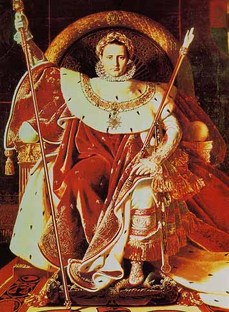
Who's in charge?
1-1 When the king dies, there's a prince waiting to be crowned. Rey muerto, príncipe coronado.
Proverbs express literal truths, but also have symbolic meaning. This one talks clearly about transitory power and reminds us that we're mortal. No matter how important we think we are, one day we won't be around anymore, and someone else will take our place. There's always someone - a student, a junior colleague, an assistant, an apprentice, an understudy, a son or daughter - who's going to step in and replace us. They don't necessarily wish us harm - maybe they even love us - but, they know there's going to be a day when we're not around anymore, and they're going to occupy the vacant spot we leave behind. That's the nature of life.
Ocana (1) is an odu (sign) that talks about birth and death, or beginnings and ends, as part of a natural cycle. This proverb, in particular, reminds us not to take ourselves so seriously. In what area of our life are we thinking of ourselves as the king or queen? Work? Home? In a relationship? Do we act like we can't be replaced? Do we think we need to devote ourselves heart and soul to some enterprise because it won't succeed without us? When this odu comes up in a reading, the client needs to sit back and take a good look at his attitudes and behavior. In all likelihood, he feels irreplaceable in some way, and he's obsessed with whatever it is that makes him feel so important. He might be a workaholic who neglects his family and homelife because he thinks his business would fall apart without him. He might be a controlling parent who's alienating his children because he won't allow them to make a move without his permission. When Ocana comes with osorbo (misfortune), the client can be seriously out of balance. He can be extremely stubborn, willful, and short tempered. He feels he has to be right all the time, and he can't stand to be corrected. He truly believes he knows better than everyone else; this makes him difficult to live with and, eventually, it drives people away.
Proverbs express literal truths, but also have symbolic meaning. This one talks clearly about transitory power and reminds us that we're mortal. No matter how important we think we are, one day we won't be around anymore, and someone else will take our place. There's always someone - a student, a junior colleague, an assistant, an apprentice, an understudy, a son or daughter - who's going to step in and replace us. They don't necessarily wish us harm - maybe they even love us - but, they know there's going to be a day when we're not around anymore, and they're going to occupy the vacant spot we leave behind. That's the nature of life.
Ocana (1) is an odu (sign) that talks about birth and death, or beginnings and ends, as part of a natural cycle. This proverb, in particular, reminds us not to take ourselves so seriously. In what area of our life are we thinking of ourselves as the king or queen? Work? Home? In a relationship? Do we act like we can't be replaced? Do we think we need to devote ourselves heart and soul to some enterprise because it won't succeed without us? When this odu comes up in a reading, the client needs to sit back and take a good look at his attitudes and behavior. In all likelihood, he feels irreplaceable in some way, and he's obsessed with whatever it is that makes him feel so important. He might be a workaholic who neglects his family and homelife because he thinks his business would fall apart without him. He might be a controlling parent who's alienating his children because he won't allow them to make a move without his permission. When Ocana comes with osorbo (misfortune), the client can be seriously out of balance. He can be extremely stubborn, willful, and short tempered. He feels he has to be right all the time, and he can't stand to be corrected. He truly believes he knows better than everyone else; this makes him difficult to live with and, eventually, it drives people away.

Power doesn't last forever
This proverb tells the client to lighten up. No matter how important or powerful we think we are, the world won't end when we're not here anymore. Everything will go on without us, and someone else will fill our shoes. In the meantime, life is short, so why not enjoy it? Why should we exhaust ourselves working all the time? Why should we make ourselves sick worrying about things we can't control? What's the worst that would happen if we give up some of our control and walk away from things once in a while? We don't have to go to extremes and give up everything that matters to us, but we should examine our lives carefully to know what's truly important, and where our priorities lie. We need to be sure we're living a life we enjoy. Kings carry a lot of responsibility on their shoulders, and they make a lot of personal sacrifices for the good of the kingdom. Perhaps the king's subjects appreciate his sacrifices, and perhaps they don't. Perhaps they admire and respect him, and perhaps they don't. The only thing that's certain is that one day the king will die and a new king will be crowned. People will bow down to the new king, and the cycle will repeat itself with another prince on the sidelines waiting to be crowned.
 RSS Feed
RSS Feed
